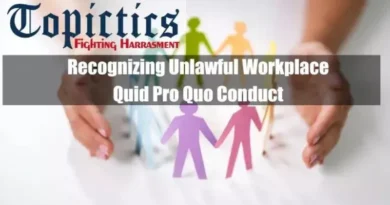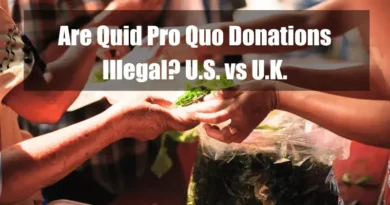Bribery and Quid Pro Quo – Connection, Similarity, and Difference
Bribery and quid pro quo are closely connected concepts often encountered in discussions of ethics, law, and business practices. Both involve an exchange where something of value is offered to influence the actions or decisions of the recipient. However, their connotations and legal implications differ significantly. Bribery explicitly entails corruption and illegality, involving offering, giving, receiving, or soliciting something of value to sway an action improperly. On the other hand, quid pro quo, which translates to “something for something” in Latin, does not always imply wrongdoing. It represents a mutual agreement where each party provides something of value to the other. The distinction lies in the intent and legality of the exchange; a quid pro quo can be ethical and legal if it involves mutual, transparent agreements without coercion or corruption, whereas bribery is inherently unlawful and unethical.
10 Synonyms of Bribery
- Corruption
- Graft
- Kickback
- Payoff
- Payola
- Sweetener
- Backhander
- Fix
- Lubrication
- Grease
Why These Are Synonyms of Bribery
1. Corruption

Corruption encompasses various unethical behaviors, with bribery being a primary component. It involves the abuse of entrusted power for private gain. In many contexts, bribery is seen as a direct manifestation of corruption, as it subverts the integrity of decision-making processes. The term “corruption” often brings images of politicians accepting money for favorable legislation, officials manipulating systems for personal gain, or corporate executives making under-the-table deals. This abuse of power is a hallmark of bribery, making corruption a fitting synonym.
2. Graft
Graft refers to the unscrupulous use of one’s position for personal gain, typically involving bribery. It often describes political corruption, where officials illegally exploit their power to obtain money or favors. Graft implies sophistication and systemic corruption where individuals leverage their authority for personal benefit. For example, a government official may engage in graft by awarding business contracts in exchange for kickbacks. This direct exchange of favors for personal enrichment aligns closely with the concept of bribery.
3. Kickback
A kickback is a form of negotiated bribery where a portion of the payment for a contract or service is returned to the person facilitating the deal as a reward for their involvement. It is a covert exchange, reinforcing the illicit nature of bribery. Kickbacks are common in industries where contracts are lucrative, such as construction or defense. For instance, a contractor might inflate the cost of a project and then return a portion of the excess to the official who awarded the contract. This under-the-table transaction is a clear example of bribery.
4. Payoff
Payoff is a broad term for a bribe or reward to secure favorable treatment or the execution of a deal. It implies a clandestine agreement exchanging money or other benefits to influence decisions or actions. In bribery, a payoff might involve paying a customs officer to overlook contraband or a corporation providing lavish gifts to regulatory officials to ensure lenient oversight. The term underscores the transactional nature of bribery, where the payoff is the incentive for the desired action.
5. Payola

Payola is specific to the music and broadcasting industry, describing the practice of bribing someone to use their influence to promote certain songs or artists. This form of bribery distorts fair competition and undermines ethical standards. Historically, payola scandals have involved record companies paying radio stations to play their songs more frequently, thus manipulating public taste and music charts. This illicit exchange of money for airplay is a direct form of bribery, emphasizing the corrupting influence of money on professional decisions.
6. Sweetener
A sweetener is an incentive or bribes to persuade someone to accept a deal or decision. It implies adding an attractive benefit to sway the recipient’s decision, aligning closely with the essence of bribery. A sweetener might offer additional perks or benefits to secure a contract in business negotiations. For example, a company bidding for a government contract might offer an official an expensive holiday as a sweetener to influence their decision. This additional, often illicit, incentive highlights the manipulative nature of bribery.
7. Backhander
A backhander is a slang term for a bribe, often as a discreet, under-the-table payment. It emphasizes the secretive and illegal aspect of bribery, highlighting the corrupt exchange of favors. Backhanders are often associated with small-scale corruption, such as paying an inspector to overlook violations or bribing a clerk to expedite paperwork. The term conveys such transactions’ hidden, dishonest nature, underscoring their illegality and ethical violations.
8. Fix
The term “fix” denotes an arrangement where outcomes are manipulated through bribery or corrupt influence. It implies a premeditated effort to alter decisions or results underhandedly. Fixing can occur in various contexts, from sporting events to judicial decisions. For instance, fixing a sports match involves paying players or officials to ensure a specific outcome, while fixing a court case might involve bribing a judge to rule favorably. This manipulation of results through illicit means is a quintessential example of bribery.
9. Lubrication
Lubrication is a metaphorical term suggesting that bribes are used to “smooth” processes and facilitate actions that would otherwise face obstacles. It underscores the corrupt means of easing transactions or agreements. Lubrication might involve paying officials to expedite approvals or bypass regulations in bureaucratic systems. This use of bribes to streamline processes highlights the unethical shortcuts taken to achieve desired outcomes, characterizing the essence of bribery.
10. Grease
Like lubrication, grease refers to money or favors given to expedite processes or gain favor. It underscores the unethical nature of using bribes to influence outcomes or decisions. Greasing the palms of officials to secure business permits, licenses, or contracts is a common form of bribery. The term conveys the idea of making things “run smoothly” through corrupt payments, emphasizing such exchanges’ transactional and illicit nature.
Bribery Synonyms’ Connection to Quid Pro Quo

1. Corruption
Corruption and quid pro quo intersect where the exchange is intended to manipulate outcomes illicitly. While quid pro quo can exist without corruption, in cases of bribery, it invariably results in corrupt practices. For example, a business might engage in a corrupt quid pro quo by providing campaign contributions to a politician in exchange for favorable legislation. Though presented as a legal contribution, this exchange is corrupt due to the expectation of preferential treatment.
2. Graft
Graft and quid pro quo are related through the expectation of reciprocity. In graft, the quid pro quo is usually corrupt, with officials expecting a return for favors granted, making it a form of bribery. A classic example is a public official who awards contracts to companies that provide them with kickbacks. The mutual benefit of graft – the company gains the contract, and the official gains illicit rewards – exemplifies a corrupt quid pro quo arrangement.
3. Kickback
Kickbacks are quintessential examples of quid pro quo, where the expectation of reciprocal action or benefit is explicit. The exchange is inherently corrupt, aligning it closely with bribery. In the construction industry, for instance, a contractor might receive a project from a government official in return for a percentage of the contract’s value as a kickback. This mutual exchange of favors for money represents a clear case of quid pro quo driven by bribery.
4. Payoff
A payoff is a straightforward quid pro quo, where the transaction involves an expected return for the money or favor given. It highlights the reciprocal nature of bribery. In a corporate setting, an executive might offer a payoff to a regulator to ignore safety violations. The regulator’s decision to overlook the violations in return for the bribe exemplifies a corrupt quid pro quo arrangement, where both parties benefit from the exchange.
5. Payola
Payola operates on a quid pro quo basis, where broadcasters receive money or favors in exchange for promoting specific content. Its corrupt nature ties it directly to bribery. For instance, a record label might pay a radio station to play their artist’s song frequently, expecting increased airplay in return. Though illegal and unethical, this mutually beneficial arrangement is a clear example of quid pro quo influenced by bribery.
6. Sweetener
Sweeteners in quid pro quo arrangements serve as incentives to secure agreements or actions. The expectation of a return makes it a form of bribery when the inducement leads to unethical outcomes. In international trade, a company might offer a sweetener to a foreign official to win a lucrative contract. The official’s favorable treatment in return for the bribe demonstrates a quid pro quo relationship driven by corrupt incentives.
7. Backhander
Backhanders exemplify a quid pro quo arrangement in which the bribe ensures a favorable decision or action. The clandestine nature of the exchange mirrors the covert operations of bribery. For example, a business might give a backhander to a local official to avoid regulatory inspections. The official’s decision to overlook potential violations in return for the bribe underscores the corrupt quid pro quo arrangement.
8. Fix
Fixing involves a quid pro quo arrangement where outcomes are predetermined through corrupt means. It represents bribery by manipulating results in exchange for favors or money. Fixing a match involves paying players or officials to ensure a specific result. The expectation of a rigged outcome in return for the bribe highlights the quid pro quo nature of the arrangement, driven by corruption.
9. Lubrication
Lubrication, in a quid pro quo context, implies that exchanging money or favors ensures smoother operations. The unethical facilitation equates to bribery when it skews fairness. For example, a company might pay officials to expedite the approval of permits. The officials’ expedited actions in return for the bribes illustrate a corrupt quid pro quo relationship, where the “lubrication” facilitates illicit benefits.
10. Grease
Grease works as a quid pro quo by expediting processes through unethical payments or favors. The expectation of a facilitated result ties it to the principles of bribery. In international business, companies might grease the palms of foreign officials to secure favorable trade deals. The officials’ favorable treatment in return for the bribes represents a quid pro quo arrangement rooted in corruption.
The Law of the United States on Bribery and Its Synonyms

| Law/Term | Description |
|---|---|
| The Bribery Statute (18 U.S.C. § 201) | Primary federal law addressing bribery of public officials and witnesses. Illegal to offer or accept anything of value to influence an official act or to induce unlawful actions. |
| Elements of Bribery | – A thing of value must be offered, given, or promised. – The recipient must be a public official or selected to be one. – The intent must be to influence an official act or induce unlawful action. |
| The Foreign Corrupt Practices Act (FCPA) | Prevents bribery of foreign officials to obtain or retain business. Prohibits payments to foreign officials to influence decisions. Mandates accurate records and internal controls. |
| Key Provisions of the FCPA | – Prohibits payment, offer, or promise of value to foreign officials. – Intent to influence official actions for business advantages. – Requires accurate bookkeeping and internal control systems. |
| Corruption | Broad term covering various forms of bribery. Addressed by the Hobbs Act and the RICO Act. |
| The Hobbs Act (18 U.S.C. § 1951) | Prohibits robbery or extortion affecting commerce, including extortion under color of official right. |
| The RICO Act (18 U.S.C. §§ 1961-1968) | Targets organized crime, prosecuting individuals involved in racketeering activities including bribery. Allows asset forfeiture from corrupt practices. |
| Graft | Misuse of public office for personal gain, typically involving bribery. Addressed by honest services fraud statutes. |
| Honest Services Fraud (18 U.S.C. § 1346) | Defines schemes to defraud as depriving others of honest services. Involves officials or fiduciaries using their positions for personal gain through bribery or kickbacks. |
| Kickback | Addressed by the Anti-Kickback Act and the healthcare-specific Anti-Kickback Statute. |
| The Anti-Kickback Act of 1986 (41 U.S.C. §§ 8701-8707) | Prohibits contractors from providing, soliciting, or accepting kickbacks for favorable treatment in government contracts. |
| The Anti-Kickback Statute (42 U.S.C. § 1320a-7b(b)) | Targets the healthcare industry, prohibiting remuneration for referrals for services covered by federally funded programs. |
| Payoff | Similar to bribery, laws against payoffs criminalize offering or receiving money for favorable treatment or decisions. |
| Federal Laws Against Payoffs | Prohibit offering or receiving money or valuables in exchange for preferential treatment or decisions by public officials or fiduciaries. |
| Payola | Practice of paying for favorable media coverage, addressed by the Communications Act. |
| The Communications Act of 1934 (47 U.S.C. § 317) | Requires broadcasters to disclose when airtime is purchased, including for music played in exchange for payment. Ensures transparency and prevents undisclosed commercial influence. |
| Sweetener, Backhander, Fix, Lubrication, Grease | Colloquial terms for various forms of bribery and corrupt practices. Covered under general statutes prohibiting bribery, kickbacks, and corruption, such as 18 U.S.C. § 201. |
| General Anti-Bribery and Corruption Statutes | These terms describe practices generally covered under the primary bribery statute and related laws. Prohibit offering, giving, or receiving value for influence over decisions or actions. |
Bribery and its related forms of corruption are strictly regulated under various federal and state laws in the United States. These laws are designed to maintain the integrity of governmental and business operations by prohibiting the exchange of anything of value to influence actions or decisions. The legal framework encompasses a wide range of activities that fall under bribery, including corruption, graft, kickbacks, and more. Here’s a detailed discussion of the U.S. laws concerning bribery and its synonyms.
Federal Bribery Laws
1. The Bribery Statute (18 U.S.C. § 201)
The Bribery Statute is the primary federal law addressing bribery of public officials and witnesses. Under this statute, it is illegal to directly or indirectly give, offer, or promise anything of value to a public official to influence any official act or to induce the official to commit fraud or neglect their lawful duties.
Elements of Bribery Under 18 U.S.C. § 201:
- A thing of value must be offered, given, or promised.
- The recipient must be a public official or a person selected to be a public official.
- The intent must be to influence an official act, or to induce the public official to commit fraud or act unlawfully.
The statute also covers the acceptance of bribes by public officials, making it a crime for an official to demand, seek, receive, or accept anything of value in return for being influenced in the performance of their official duties.
2. The Foreign Corrupt Practices Act (FCPA)
The FCPA is a significant law aimed at preventing bribery of foreign officials to obtain or retain business. It applies to all U.S. persons and certain foreign issuers of securities.
Key Provisions of the FCPA:
- It prohibits the payment, offer, authorization, or promise of money or anything of value to foreign officials.
- The intent must be to influence the foreign official to act or decide in their official capacity to help obtain or retain business.
The FCPA also mandates that companies maintain accurate books and records and have an adequate system of internal controls to detect and prevent corrupt practices.
Final Thoughts on “Synonyms of Bribery and Quid Pro Quo”
While bribery and quid pro quo overlap in their transactional nature, they differ in legality and ethics. The synonyms of bribery reflect various forms of corrupt exchanges that inherently carry an expectation of reciprocation, thus connecting to quid pro quo. Understanding these terms helps clarify the nuances in discussions about ethical and legal standards in professional environments. By recognizing the various forms and implications of bribery and quid pro quo, individuals and organizations can better navigate ethical challenges and maintain integrity.
F.A.Q.s
1. Can quid pro quo arrangements ever be ethical?
Yes, quid pro quo arrangements can be ethical if they involve mutually agreed exchanges without coercion or corruption. For example, trading services in a business partnership where both parties benefit equally and transparently can be ethical. The key is the absence of deceit or undue influence. Ethical quid pro quo arrangements are typically characterized by openness, fairness, and mutual benefit, ensuring that both parties are satisfied with the exchange.
2. How can organizations prevent bribery and corruption?
Organizations can prevent bribery and corruption by implementing robust compliance programs, conducting regular audits, and fostering a culture of transparency and integrity. Clear policies, employee training, and whistleblower protection are essential to maintaining ethical standards. Establishing a strong ethical framework and encouraging employees to report suspicious activities without fear of retaliation are critical steps in preventing corrupt practices.
3. Are there industries more prone to bribery and quid pro quo practices?
Due to high-value contracts and complex regulatory environments, certain industries, such as construction, healthcare, and government contracting, are more prone to bribery and quid pro quo practices. These sectors often involve significant discretionary power, making them vulnerable to corrupt practices. These industries’ high stakes and competitive nature can create pressure to engage in unethical behavior to secure business advantages or expedite processes.
By understanding these dynamics and implementing preventative measures, individuals and organizations can effectively navigate the complexities of ethical and legal standards.









